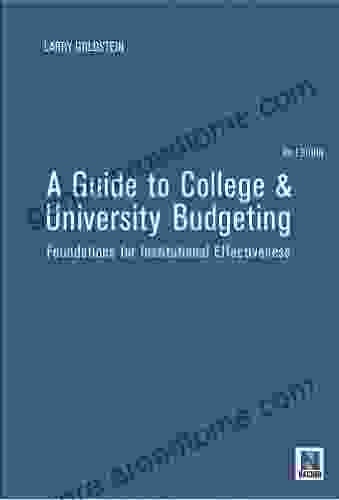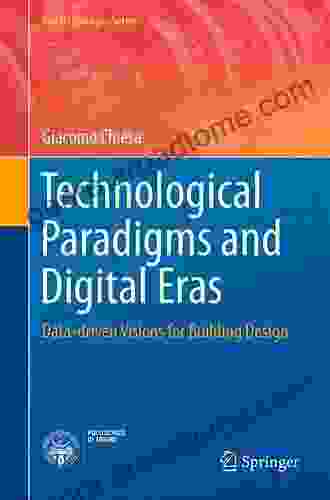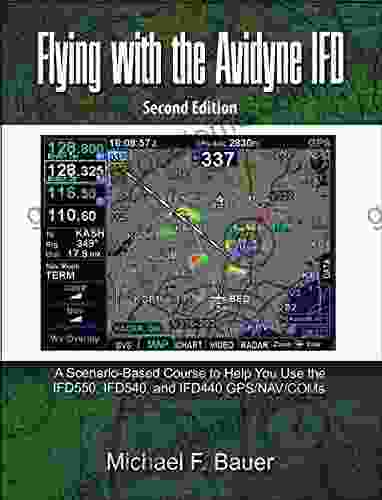Navigating the Maze of College and University Budgeting: An In-Depth Guide to Financial Success

The transition from high school to college or university marks a significant chapter in a young person's life, brimming with excitement and new responsibilities. However, amidst the academic adventures and social exploration, managing finances can often feel like an overwhelming labyrinth. The Guide to College and University Budgeting serves as an invaluable beacon, illuminating the path towards financial literacy and empowering students to navigate this complex landscape with confidence.
Why Budgeting Matters
Budgeting is not simply about restricting your spending but rather about taking control of your financial resources. It allows you to:
4.1 out of 5
| Language | : | English |
| File size | : | 7016 KB |
| Text-to-Speech | : | Enabled |
| Screen Reader | : | Supported |
| Enhanced typesetting | : | Enabled |
| Word Wise | : | Enabled |
| Print length | : | 239 pages |
| Lending | : | Enabled |
- Track your income and expenses: Gain a clear understanding of where your money is coming from and where it's going.
- Plan for the future: Anticipate upcoming expenses and allocate funds accordingly to avoid unexpected financial emergencies.
- Make informed decisions: Prioritize your expenses and make smart choices about where to allocate your money.
- Reduce financial stress: Knowing you have a plan in place can significantly reduce the anxiety associated with managing finances.
Step-by-Step Guide to Budgeting
Crafting a budget is a process that requires discipline and consistency. Follow these steps to create a comprehensive financial roadmap:
- Track your expenses: Start by noting down every expense you make for at least two weeks, including small Free Downloads like coffee or snacks. Use a spreadsheet or budgeting app to record your transactions.
- Categorize expenses: Divide your expenses into categories such as tuition, housing, food, entertainment, transportation, and personal care. This will help you identify areas where you can save or optimize your spending.
- Set realistic income expectations: Determine all sources of income, including scholarships, grants, part-time jobs, or parental support. Be realistic about your income and avoid overestimating.
- Allocate funds: Assign specific amounts to each expense category based on your income and priorities. Consider using the 50/30/20 rule, where 50% of your income goes towards essential expenses, 30% towards discretionary spending, and 20% towards savings.
- Review and adjust regularly: Budgeting is an ongoing process. Review your budget regularly, usually monthly, and make adjustments as needed. Life circumstances, expenses, and priorities can change, so your budget should be flexible.
Types of College Expenses
Understanding the various types of expenses you may encounter can help you better prepare your budget. Here are some of the major categories:
Tuition and Fees:
- Tuition costs vary widely depending on the institution, type of program, and state residency.
- Fees include additional charges for services such as registration, student activities, and technology.
Housing:
- On-campus housing costs typically include rent, utilities, and meal plans.
- Off-campus housing costs may include rent, utilities, security deposit, and shared expenses with roommates.
Food:
- Meal plans are available on many campuses and offer a convenient way to cover meals.
- Groceries and dining out costs can be significant, especially for students living off-campus.
Transportation:
- Public transportation or ride-sharing services are common options for students without cars.
- Car ownership expenses include gas, insurance, maintenance, and parking.
Books and Supplies:
- Textbooks can be expensive, and the cost varies depending on the course and publisher.
- Other supplies such as laptops, notebooks, and pens are necessary for academic success.
Personal Expenses:
- These expenses include clothing, entertainment, toiletries, and personal care items.
- Personal expenses can vary widely depending on individual lifestyle and preferences.
Tips for Saving Money
Navigating college or university on a budget is possible with a few smart strategies:
- Utilize financial aid: Explore scholarships, grants, and work-study programs to offset tuition and living expenses.
- Live frugally: Consider sharing housing with roommates or living in an affordable off-campus location.
- Cook meals at home: Eating out can be expensive. Save money by preparing meals in your dorm room or shared kitchen.
- Use public transportation: If possible, opt for public transportation or carpooling to save on transportation costs.
- Buy used textbooks: Purchasing used textbooks can significantly reduce the cost of educational materials.
- Seek discounts and coupons: Take advantage of student discounts and coupons for entertainment, groceries, and other Free Downloads.
Resources for College Budgeting
Numerous resources are available to assist students with budgeting and financial literacy:
- Financial aid office: The financial aid office at your college or university can provide guidance on financial aid options and budgeting assistance.
- Student services: Many colleges offer student services programs that include financial counseling and workshops.
- Budgeting apps: Utilize budgeting apps to track your expenses, set financial goals, and stay on top of your budget.
- Online resources: Numerous websites and online platforms offer budgeting tools, calculators, and tips.
The Guide to College and University Budgeting empowers students with the knowledge and tools they need to navigate the financial complexities of higher education. By understanding the importance of budgeting, following the step-by-step guide, and utilizing available resources, students can gain control of their finances, reduce stress, and make informed decisions that will lay the foundation for a financially secure future. Remember, budgeting is an ongoing journey, and with consistency and a positive mindset, you can master the art of financial success in college and beyond.
4.1 out of 5
| Language | : | English |
| File size | : | 7016 KB |
| Text-to-Speech | : | Enabled |
| Screen Reader | : | Supported |
| Enhanced typesetting | : | Enabled |
| Word Wise | : | Enabled |
| Print length | : | 239 pages |
| Lending | : | Enabled |
Do you want to contribute by writing guest posts on this blog?
Please contact us and send us a resume of previous articles that you have written.
 Book
Book Novel
Novel Page
Page Chapter
Chapter Text
Text Story
Story Genre
Genre Reader
Reader Library
Library Paperback
Paperback E-book
E-book Magazine
Magazine Newspaper
Newspaper Paragraph
Paragraph Sentence
Sentence Bookmark
Bookmark Shelf
Shelf Glossary
Glossary Bibliography
Bibliography Foreword
Foreword Preface
Preface Synopsis
Synopsis Annotation
Annotation Footnote
Footnote Manuscript
Manuscript Scroll
Scroll Codex
Codex Tome
Tome Bestseller
Bestseller Classics
Classics Library card
Library card Narrative
Narrative Biography
Biography Autobiography
Autobiography Memoir
Memoir Reference
Reference Encyclopedia
Encyclopedia Meir H Kryger
Meir H Kryger Russell Bishop
Russell Bishop Michael Kleiber
Michael Kleiber Lady L Reed
Lady L Reed Kjetill Oftedal
Kjetill Oftedal Paul Starr
Paul Starr Melissa Miles Mccarter
Melissa Miles Mccarter Kit Poon
Kit Poon Maya
Maya Laura Kerr
Laura Kerr Xiaoyan Lei
Xiaoyan Lei Henry M Morris
Henry M Morris Kristen Mancinelli
Kristen Mancinelli Mustafa Umar
Mustafa Umar Klyne Snodgrass
Klyne Snodgrass Mary Forsberg Weiland
Mary Forsberg Weiland Michael Hamilton
Michael Hamilton Scott La Counte
Scott La Counte William Bright
William Bright Nansubuga Nagadya Isdahl
Nansubuga Nagadya Isdahl
Light bulbAdvertise smarter! Our strategic ad space ensures maximum exposure. Reserve your spot today!

 Herman Mitchell250 Recipes For Authentic Food From Lebanon And Greece: A Mediterranean...
Herman Mitchell250 Recipes For Authentic Food From Lebanon And Greece: A Mediterranean...
 Dominic SimmonsScience and Faith: A New Introduction, Exploring the Harmony between Reason...
Dominic SimmonsScience and Faith: A New Introduction, Exploring the Harmony between Reason... Jack PowellFollow ·19.5k
Jack PowellFollow ·19.5k Edwin BlairFollow ·5.9k
Edwin BlairFollow ·5.9k E.M. ForsterFollow ·18.5k
E.M. ForsterFollow ·18.5k Gage HayesFollow ·10.7k
Gage HayesFollow ·10.7k Albert CamusFollow ·5.9k
Albert CamusFollow ·5.9k Anthony WellsFollow ·11.6k
Anthony WellsFollow ·11.6k Orson Scott CardFollow ·15.8k
Orson Scott CardFollow ·15.8k Elias MitchellFollow ·12.7k
Elias MitchellFollow ·12.7k

 Charlie Scott
Charlie ScottQuickBooks 2024 In Depth: Your Essential Guide to...
About the Book Are you ready to elevate...

 D'Angelo Carter
D'Angelo CarterUnlocking the Mysteries of Primitive Economies: A Journey...
Prepare to embark on an...

 Milton Bell
Milton BellUnveiling the Secrets of Agile Coaching: A Comprehensive...
In the ever-evolving landscape...

 Tyler Nelson
Tyler NelsonUnveiling the Treasures of Italy: A Journey of Discovery...
Embark on an enchanting expedition into the...
4.1 out of 5
| Language | : | English |
| File size | : | 7016 KB |
| Text-to-Speech | : | Enabled |
| Screen Reader | : | Supported |
| Enhanced typesetting | : | Enabled |
| Word Wise | : | Enabled |
| Print length | : | 239 pages |
| Lending | : | Enabled |












